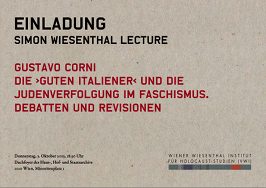Simon Wiesenthal Lectures
The Simon Wiesenthal lecture series takes place regularly every six to eight weeks and aims to present the latest research findings on the Holocaust to both a professional and a broader audience. They take into account the impressive spectrum of this discipline, the numerous questions and issues from empirical-analytical historiography to topics of cultural studies and involve young scholars as well as established academics.
Since 2007, when the Vienna Wiesenthal Institute for Holocaust Studies (VWI) was still being established, the lecture series – at that time in cooperation with the Documentation Centre of Austrian Resistance (DÖW) and the Institute of Contemporary History at the University of Vienna– has developed into the flagship of the VWI's outreach activities as a supporting element in the communication of recent academic findings in the field of Holocaust research and Holocaust and genocide studies.
For over a decade, the Austrian State Archives generously offered shelter to the Simon Wiesenthal Lectures in the roof foyer of the Haus-, Hof- und Staatsarchiv. During the challenging years of the pandemic, the lectures were held online. From autumn 2022, in order to reach out to further audiences, a new cooperation partner was found in the Wien Museum. Until the reopening of the main location at Karlsplatz, the SWL will take place at MUSA, Felderstraße 6-8, next to the Vienna City Hall.
| Simon Wiesenthal Lecture | |||
| Gustavo Corni: Die "guten Italiener" und die Judenverfolgung des Faschismus. Debatten und Revisionen | |||
Thursday, 3. October 2013, 18:30 - 20:00 Dachfoyer des Haus-, Hof- und Staatsarchivs, Minoritenplatz 1, 1010 Wien
|
|||
Das Bild des „guten Italieners“ (und des „bösen Deutschen“) spielte in der italienischen Öffentlichkeit und Historiographie bei der Legitimierung der Demokratie nach 1945 eine zentrale Rolle. Die Verharmlosung wesentlicher Merkmale der faschistischen Diktatur bezog sich in erster Linie auf das Verhalten der italienischen Streitkräfte im Weltkrieg sowie allgemein auf das Verhältnis zwischen Faschismus und Nationalsozialismus, betraf aber auch die Frage der Verstrickung Italiens in den Massenmord an den Jüdinnen und Juden Europas. Der einflussreiche Historiker Renzo De Felice versuchte in den 1970er-Jahren den italienischen Faschismus aus dem „sengenden Kegel des Holocaust“ herauszuhalten. Seine Betonung des Unterschieds von Nationalsozialismus und Faschismus blieb im italienischen Diskurs lange hegemonial. Neuere Studien hingegen zeigen ein anderes Bild und heben zwei Aspekte hervor: Einerseits die weitgehende Verbreitung antisemitischer, durchaus endogener Strömungen im italienischen Faschismus; andererseits die unmittelbare Teilnahme von italienischen Institutionen und ItalienerInnen und an der Judenvernichtung. Gustavo Corni, geboren 1952, ist – nach Lehrtätigkeiten in Bologna, Venedig, Chieti und Triest – Professor für Neueste Geschichte an der Universität Trient und ist Spezialist für die Geschichte Deutschlands im 20. Jahrhundert, sowie der vergleichenden Geschichte der Diktaturen und der Sozialgeschichte beider Weltkriege. Nach Fellowships in Oxford und Freiburg, 1995 Gastprofessur an der Universität Wien. Er ist Verfasser zahlreicher Monographien und Aufsätze, darunter: Raccontare la guerra. La memoria organizzata (Mailand, 2012), Fascismo. Condanne e revisioni (Rom, 2011) und Mitautor von: People on the move. Forced population movements during the Second World War and its aftermath (Oxford, 2009).
|
|||












